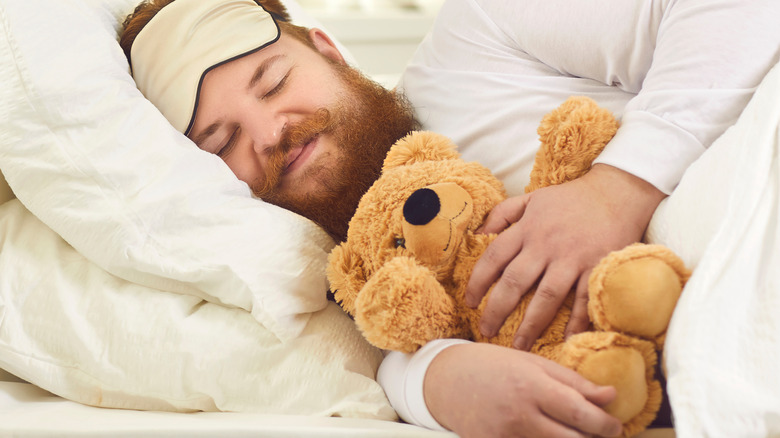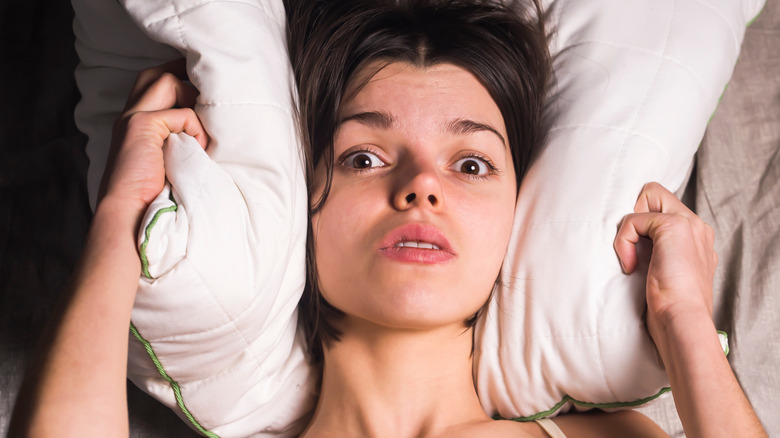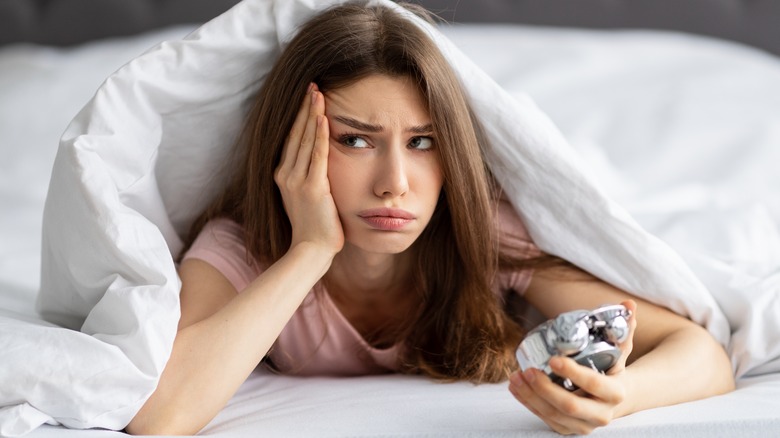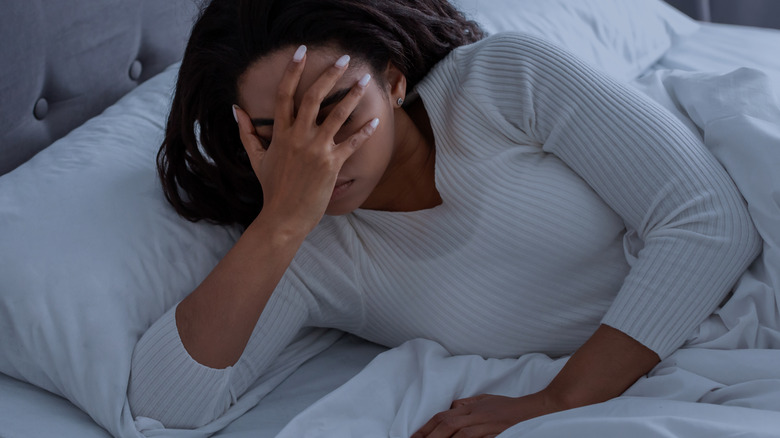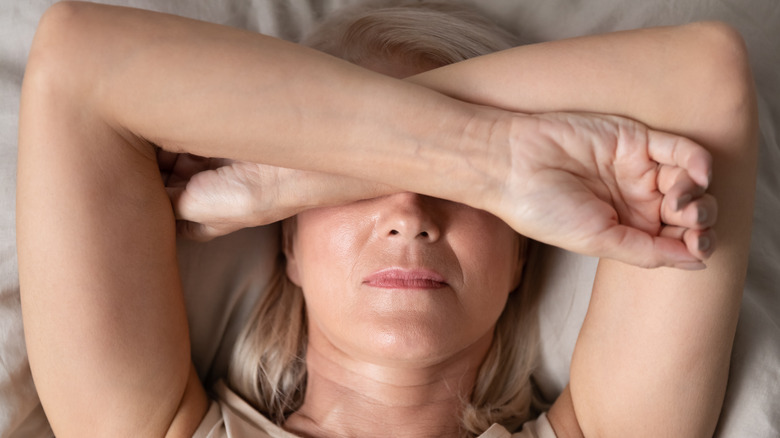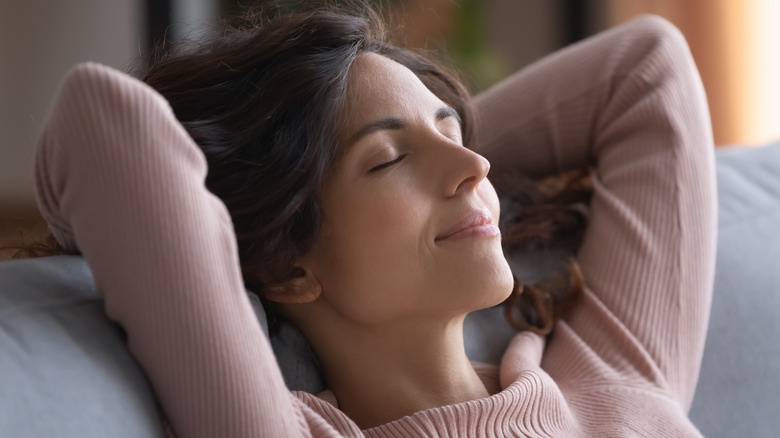What It Really Means If You Don't Dream
Dreams are a bit of a mystery, even to scientists. In simple terms, dreams are made up of thoughts, sensations, and images that basically replay in our minds while we're sleeping, according to Medical News Today. Even though most people experience dreams, scientists are still scratching their heads about exactly how dreams work and why we have them, but they have some theories.
Speaking to Allure, Rafael Pelayo, a clinical professor of psychiatry and behavioral sciences at the Stanford Center for Sleep Sciences and Medicine, explained that dreaming is a tool our brains use to process information. "So you need to remember some things, but you also need to forget some things; dreaming is a situation of remembering and forgetting simultaneously." A professor of neuroscience and psychology at the University of California, Berkeley, Matthew Walker, is of the opinion that dreaming is almost like emotional therapy. "Dreaming has the potential to help people de-escalate emotional reactivity, probably because the emotional content of dreams is paired with a decrease in brain noradrenaline," he wrote for Greater Good Magazine. Something else scientists know: Dreams and REM (rapid eye movement) sleep go hand in hand. Clinical psychologist Kelly Baron explains that scientists think REM works to revive memories, which helps the brain to store information.
It's normal to be concerned if you don't seem to dream like everyone else. However, there might be a very simple explanation for it. Read on as we discover what might be causing dreamless sleep.
Is it possible to never dream?
If you're one of those people who can rarely recall having a dream, you might think that a night of dreamless sleep is very much possible, even normal. And it might be, but scientists haven't found a way to prove that dreamless sleep exists.
In an article Dr. Patrick McNamara wrote for Psychology Today, he explains that "[t]o really be sure that an individual does not dream, we would have to follow him for years and perform awakenings from REM sleep to see if he dreamed." He adds that only after years of observing this person would scientists be able to conclude that they do, in fact, not dream. McNamara also speculates that it might be possible that some people simply don't have the ability to recall dreams, or that REM sleep isn't necessarily accompanied by dreams. Of course, there's no way to prove this just yet, so scientists can't say for sure whether it is indeed possible to never experience dreams.
There is evidence, however, that more people are starting to experience dreamless sleep. This concerns health experts, since a lack of dreams might also indicate a lack of quality sleep, which can lead to other health issues like Alzheimer's. Interestingly, there appears to be a strong link between depression and diminished REM and dream recall, based on findings cited by a 2017 paper published in the Annals of the New York Academy of Sciences.
You're probably just not remembering your dreams
If you're feeling a little concerned about the fact that you can't recall the last time you had a dream, you don't need to panic just yet: You might actually dream but simply not be able to remember it once you wake up. In fact, waking up suddenly can actually be detrimental to your ability to recall dreams, per dream expert Dr. Rubin Naiman (via MindBodyGreen).
If you're a super quick, early riser and use an alarm clock, you're setting yourself up for dream memory loss, so to speak. "Grogginess is an exquisite hybrid state of consciousness," Naiman says. So if you're always bounding out of bed the second that alarm goes off, it might be the reason you're not able to remember your dreams. Taking a moment to slowly wake up might help you recall some of what you dreamt during the night.
While not all scientists agree that dreamless sleep is nothing to worry about, sleep researcher Dr. Rebecca Robbins says that dreaming doesn't necessarily indicate whether you're getting quality sleep or not. Dr. Girardin Jean-Louis, a sleep expert and professor at NYU, agrees. "Most people experience the REM cycles several times nightly. Thus, the issue is a failure to remember dreams rather than a suggestion of being unhealthy," he says. He adds that you might even be able to get better at remembering your dreams with practice, and waking up slowly is one of the tactics he recommends.
The reason some people forget dreams while others don't
It's pretty obvious that some people can recall their dreams in vivid detail, while others struggle to even remember whether they had any dreams to begin with. But why is that? Well, it might actually have a lot to do with how your brain operates.
A 2022 study published in Nature and Science of Sleep found that those who easily recall dreams have different neurophysiological profiles than those who aren't able to recall dreams as effectively. These neurophysiological differences were evident in both wakefulness and sleep, and were specifically observed in parts of the brain that make up the default mode network. Researchers also discovered that people's personalities can play a role in their ability to recall dreams. Those who possess qualities like creativity and are open to experiencing their dreams have an easier time remembering them.
How light or deep you typically sleep can also have an impact on dream recall. A 2017 study published in Frontiers in Human Neuroscience found that light sleepers can recall dreams more effectively. Researchers concluded that this is because light sleepers tend to wake up more often, as they are more sensitive to auditory stimuli than those who sleep deeply. These moments in which people are slightly awake and aware allow for dream recall to happen. Per the findings, people needed around two minutes of this semi-awake state for their brain to file the dream away in their long-term memory.
You might be struggling with a sleep disorder
A sleep disorder might be the reason dreams are evading you, according to Healthline. Some sleep disorders can mess with your REM sleep, leading to dreamless nights. If you struggle with sleep apnea or have constant insomnia, you might not be entering the REM stage of sleep as often as you should.
Sleep apnea occurs when you periodically stop breathing throughout the night because of your throat muscles relaxing. This is a major sleep interrupter. "Apneas are highest during REM sleep when your muscles naturally turn off," sleep psychologist Dr. Joshua Tal told Well+Good. "So if you are not dreaming, it could be a sign your sleep quality is being broken up by breathing events."
Insomnia, on the other hand, can cause you to frequently wake up throughout the night, which can also mess with your sleep cycles, according to the Cleveland Clinic. Insomnia is incredibly common (around 50% of adults suffer from it at some point), and it's typically caused by stress or environmental factors, like sleeping in a space that is noisy or not dark enough. If you suffer from insomnia and leave it untreated, you won't only continue to have dreamless nights, but you'll also put yourself at risk for other illnesses, like cardiovascular disease, diabetes, anxiety, and depression. The same goes for sleep apnea. See your doctor so they can diagnose and treat the problem.
You may be experiencing a lot of stress
A 2014 study review published in Behavioral Sleep Medicine found that stress can have an adverse impact on sleep, and has an influence on the amount of REM sleep someone gets. Overall sleep efficiency also decreases as stress levels rise, since being in an anxious state causes people to wake up frequently during the night.
While research focusing on the link between ordinary stress and sleep is limited, researchers speculate that different stressors could each have a different impact on people's sleep quality. Drawing from existing studies, they found that mild stressors can decrease REM sleep, while very stressful events can actually cause REM sleep to increase. This might be the reason some people experience "stress dreams" when going through a very stressful time, instead of not dreaming at all (via the Cleveland Clinic).
If you are stressed and suspect that that's the reason you don't dream, try creating a soothing bedtime routine to help your body and mind wind down for the night. You can also try to pencil in time to worry. Yes, we're serious. Setting aside time to focus on what bothers you can help you deal with it better. The secret is to set out a specific block of time, like 15 minutes, and schedule something fun afterward so you don't end up worrying for hours on end. You can also incorporate some relaxation techniques into your daily routine, like meditation or breathing exercises.
Alcohol, cannabis, caffeine, and even your phone could be to blame
There's nothing like a strong cup of coffee in the morning to wake you up, and after-work drinks with friends feel super relaxing, but caffeine and alcohol could actually be impacting your sleep, and, in turn, your ability to dream, according to a 2017 paper published in the Annals of the New York Academy of Sciences (via The Healthy).
The paper's author, sleep and dream specialist Dr. Rubin Naiman, explains that the very substances we tend to turn to when we need to alleviate stress, like cannabis and alcohol, can disrupt our sleep cycle. These compounds encourage the release of certain hormones that are known to mess with REM sleep. "I think there's an innocent goal: People want to relax and expand their consciousness," he explains, adding that this "actually happens naturally in dreaming, and if we don't dream well, it increases the pressure to find other ways of doing that."
Naiman says that having one glass of wine won't necessarily cause a dreamless sleep, but people seldomly drink that little at a time, and therein lies the problem. He also cautions against using cellphones, tablets, or laptops before you go to bed, since the light they emit can also impact your REM sleep negatively.
Depression and anxiety might cause dreamless nights
If you've been diagnosed with a mental health disorder, you might notice that you don't dream as much as you used to, or that you've stopped dreaming altogether. According to a 2008 study published in Dialogues in Clinical Neuroscience, around 90% of those who struggle with depression also find that the quality of their sleep declines, sometimes leading to insomnia. This can cause you to forget your dreams more often or dream less altogether, per Healthline. However, some people find that they experience more disturbing dreams and nightmares as a result of their depression.
Anxiety disorders can also mess with your dreams. Those who suffer from post-traumatic stress disorder (PTSD), generalized anxiety disorder, phobias, obsessive-compulsive disorder (OCD), and panic disorder might find that they don't dream. These disorders have an impact on REM sleep. Meanwhile, people who have severe anxiety might have the opposite problem and experience frightening dreams.
Those who suffer from bipolar disorder face similar struggles. When people with this disorder experience episodes, they tend to struggle to get consistent, quality sleep or don't feel tired at all, leading to inadequate sleep. This pattern is observed in 69% to 99% of patients with bipolar disorder (via a 2016 study in Nature and Science of Sleep).
If you or someone you know needs help with mental health, please contact the Crisis Text Line by texting HOME to 741741, call the National Alliance on Mental Illness helpline at 1-800-950-NAMI (6264), or visit the National Institute of Mental Health website.
Medication could be the cause
Some medications can mess with your sleep and, in turn, your dreams. In a 2017 paper published in the Annals of the New York Academy of Sciences (via The Healthy), sleep and dream specialist Dr. Rubin Naiman explains that some of the most common medications used today have an impact on our REM sleep, adding that very little research has been conducted to figure out how to remedy this. "But even knowing what we know about the importance of REM sleep, with memory and mental health, there's a general tendency to dismiss its value. It's striking that medical science pays virtually no attention to it," he writes.
Some chronic medications prescribed to treat mental health disorders like depression and anxiety have been shown to prevent REM sleep as well, leading to dreamless nights, according to Healthline. Common culprits include meds that are classified as selective serotonin reuptake inhibitors (SSRIs), like sertraline (commonly known as Zoloft) and fluoxetine (commonly known as Prozac).
Should you be concerned if you're not dreaming or not remembering your dreams?
So, is not having dreams something to be concerned about? Experts say it really depends on whether or not you feel energized after a night's sleep. "Whether you remember your dreams or not is actually not a sign of whether your sleep is healthy," clinical psychologist Kelly Baron told Allure. "If you wake up in the morning refreshed, then you're probably sleeping just fine, and there's nothing abnormal about it," Rafael Pelayo, clinical professor of psychiatry and behavioral sciences at the Stanford Center for Sleep Sciences and Medicine, assures.
However, if you always feel tired even though you slept for eight dreamless hours, it's a good idea to speak to your doctor. You might have some underlying conditions causing you to miss out on quality sleep, Healthline warns. Pelayo explains that there are signs you can look out for that will indicate that you're not getting enough REM sleep. Tiredness is the most obvious sign, but you might also notice that you have mood swings. Baron says it's rare for patients to visit her office because they don't dream. When they do list it as one of their issues, it's usually because their primary concern is that they can't seem to get enough sleep. Thus, a lack of dreaming is usually a result of another issue and not the main cause. In short, if you feel great in the morning, you have nothing to worry about.
Tips to remember your dreams
If you get quality sleep but can't ever seem to remember your dreams, there are a few ways to prove to yourself that you do, in fact, dream.
A great way to practice your ability to recall dreams is to keep a notebook by your bedside and write down what you can remember about a dream as soon as you wake up. "Our ability to recall dreams can be improved by simply drawing more attention to dreams," sleep researcher Dr. Rebecca Robbins told MindBodyGreen. She adds that telling your spouse about the dream can also help you to recall it better. Another great way to assist your brain in remembering dreams is to allow yourself to wake up slowly, sleep expert Dr. Rubin Naiman says. That half-awake state you're in when you wake up is perfect for recalling dreams.
If you're someone who prefers to work with data, you can invest in a sleep tracking device. These nifty gadgets can help you assess how much sleep you're getting and what the quality of your sleep is like (via Well+Good). Something else that might be helpful is starting a sleep diary. This journal will focus on your bedtime routine and help you assess what works best to prepare you for a good dream-filled sleep.
Other useful tips include reminding yourself that you'd like to dream and recall those dreams right before you go to sleep, or setting your alarm a little earlier than usual (via Healthline).

